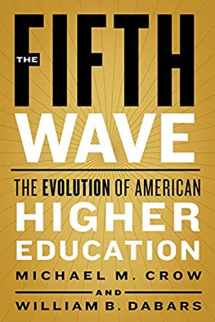
The Fifth Wave: The Evolution of American Higher Education
Book details
Summary
Description
Out of the crises of American higher education emerges a new class of large-scale public universities designed to accelerate social change through broad access to world-class knowledge production and cutting-edge technological innovation.
America's research universities lead the world in discovery, creativity, and innovation--but are captive to a set of design constraints that no longer aligns with the changing needs of society. Their commitment to discovery and innovation, which is carried out largely in isolation from the socioeconomic challenges faced by most Americans, threatens to impede the capacity of these institutions to contribute decisively and consistently to the collective good. The global preeminence of our leading institutions, moreover, does not correlate with overall excellence in American higher education. Sadly, admissions practices that flatly exclude the majority of academically qualified applicants are now the norm in our leading universities, both public and private.
In The Fifth Wave, Michael M. Crow and William B. Dabars argue that colleges and universities need to be comprehensively redesigned in order to educate millions more qualified students while leveraging the complementarities between discovery and accessibility. Building on the themes of their prior collaboration, Designing the New American University, this book examines the historical development of American higher education--the first four waves--and describes the emerging standard of institutions that will transform the field. What must emerge in this Fifth Wave of universities, Crow and Dabars posit, are institutions that are responsive to the needs of students, focused on access, embedded in their regions, and committed to solving global problems.
The Fifth Wave in American higher education, Crow and Dabars write, comprises an emerging league of colleges and universities that aspires to accelerate positive social outcomes through the seamless integration of world-class knowledge production with cutting-edge technological innovation. This set of institutions is dedicated to the advancement of accessibility to the broadest possible demographic that is representative of the socioeconomic and intellectual diversity of our nation. Recognizing the fact that both cooperation and competition between universities is essential if higher education hopes to truly serve the needs of the nation, Fifth Wave schools like Arizona State University are already beginning to spearhead a network spanning academia, business and industry, government agencies and laboratories, and civil society organizations.
Drawing from a variety of disciplines, including design, economics, public policy, organizational theory, science and technology studies, sociology, and even cognitive psychology and epistemology, The Fifth Wave is a must-read for anyone concerned with the future of higher education in our society.


We would LOVE it if you could help us and other readers by reviewing the book
Book review





